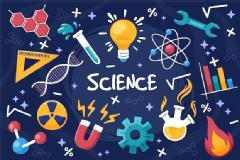1. Mathematics Masterclass
Mathematics can be challenging, but with the right approach, you can excel in your board exams. Here's how:
-
Understand Key Concepts: Focus on core topics such as Calculus, Probability, Vectors, and 3D Geometry. Break them into smaller, manageable units. For example, in Calculus, mastering differentiation and integration should be prioritized before moving to more advanced topics like applications of derivatives or integrals.
-
Practice, Practice, Practice: Maths requires regular practice. Solve problems from previous year question papers and reference books. Start with simpler problems and gradually tackle more difficult ones. This builds your confidence and helps you recognize patterns in questions.
-
Time Management: During the exam, allocate time wisely for each section. Attempt easier questions first and leave the more complex ones for later. This ensures you don’t run out of time.
-
Key Topics to Focus On: Calculus (Differentiation, Integration), Algebra (Quadratic Equations, Progressions), Vectors, 3D Geometry, and Probability. These are high-weightage topics that often appear in exams.
2. Physics Masterclass
Physics can be tricky, but understanding the concepts and practicing problems will help immensely.
-
Master the Basics: Before diving into complex problems, ensure that you have a clear understanding of fundamental concepts like Newton’s Laws of Motion, Work and Energy, Electrostatics, and Optics. These are the building blocks for solving higher-level problems.
-
Formulae and Derivations: Be thorough with important formulas and their derivations. Physics often tests the application of concepts, so understanding the derivation behind formulas like Kinematic Equations, Work-Energy Theorem, and Gauss’s Law can give you an edge.
-
Solve Numerical Problems: Focus on solving a variety of numerical problems, as they make up a large part of the paper. Apply the correct units, and use dimensional analysis to verify your answers.
-
Time Management: Physics questions can be long, so manage your time effectively. Start with easier conceptual questions and move on to the lengthy calculations once you’ve secured marks from quicker questions.
-
Key Topics: Mechanics, Electrostatics, Magnetism, Optics, and Modern Physics (especially Atoms and Nuclei). These topics consistently appear in exams.
3. Chemistry Masterclass
Chemistry is a combination of theory and practical knowledge, and mastering both is key.
-
Understand the Theory: In Organic Chemistry, focus on Reaction Mechanisms, Functional Groups, and Isomerism. In Inorganic Chemistry, focus on periodic trends, bonding, and important compounds. Physical Chemistry (like Mole Concept and Thermodynamics) requires good numerical practice.
-
Practice Chemical Reactions: Memorizing reactions and understanding mechanisms can help you in Organic Chemistry. Also, for Physical Chemistry, focus on solving numerical problems related to molarity, normality, and thermodynamics.
-
Equations and Definitions: Make sure you know the key chemical equations, laws, and definitions like Boyle’s Law, Hess’s Law, and the Arrhenius Equation. These are crucial for quick recall during exams.
-
Time Management: Divide your time wisely between theoretical questions and numerical problems. Don’t spend too much time on a single long answer.
-
Key Topics: Organic Chemistry (Hydrocarbons, Biomolecules), Inorganic Chemistry (p-Block Elements, Coordination Chemistry), and Physical Chemistry (Equilibrium, Thermodynamics, and Redox Reactions).
4. Social Science Masterclass
Social Science requires understanding concepts and retaining large amounts of information. A strategic approach is necessary.
-
Focus on Key Themes: In History, focus on important events such as the Freedom Struggle, World Wars, and National Movements. In Geography, understand the concepts of Climate, Resources, and Landforms. Political Science requires an understanding of Indian Democracy, Constitution, and Political Theories.
-
Use Diagrams and Maps: Diagrams, maps, and flowcharts are vital in subjects like Geography and History. Make sure you practice drawing maps and understanding timelines.
-
Important Dates and Events: For History and Political Science, keep a timeline of important events and dates. Focus on cause-and-effect relationships between events.
-
Writing Answers Effectively: Social Science exams are often content-heavy, so ensure your answers are structured. Start with an introduction, followed by the main content, and conclude with a summary or your opinion where appropriate.
-
Key Topics: Modern India, Geography (Resources, Population), Political Science (Indian Constitution, Politics), and Economics (Planning, Development).
Final Exam Tips for All Subjects:
- Revision: Begin revising at least two weeks before the exam. Prioritize weak areas but revise everything to ensure complete coverage.
- Practice Papers: Solve previous years’ question papers to get familiar with the exam format and time yourself.
- Healthy Routine: Maintain a balanced study routine, sleep well, and eat healthily. Stress management is crucial for peak performance.
By following these focused strategies and practicing consistently, you’ll be well on your way to excelling in your board exams.







